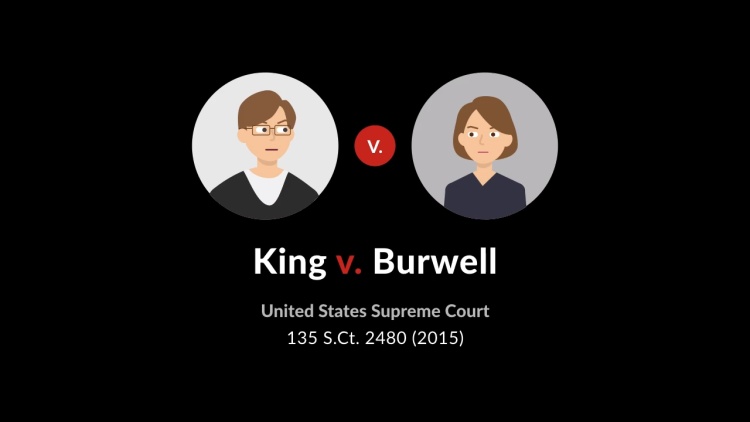King v. Burwell
United States Supreme Court
135 S. Ct. 2480 (2015)

- Written by Sean Carroll, JD
Facts
The Affordable Care Act (ACA) provides tax credits to lower-income individuals for use in purchasing health insurance. The ACA directed each state to establish an exchange from which such insurance would be purchased. If a state did not establish an exchange, the secretary of health and human services would establish and operate an exchange in the state. The ACA stated that individuals would be entitled to the tax credits for insurance plans “enrolled in through an Exchange established by the State.” The ACA directed the Internal Revenue Service (IRS) to promulgate rules and regulations to implement the tax-credit program. The IRS promulgated a regulation stating that individuals enrolled in exchange insurance plans established either by a state or by the Department of Health and Human Services (HHS) were entitled to the tax credits. David King and other Virginia residents (plaintiffs) brought suit, challenging the IRS’s regulation on the ground that it was contrary to the terms of the ACA, which provided that only individuals enrolled through a state-created exchange would be entitled to tax credits. Granting Chevron deference to the IRS’s interpretation of the ACA, the court of appeals upheld the IRS regulation providing tax credits for insurance obtained through an HHS exchange. The United States Supreme Court granted certiorari.
Rule of Law
Issue
Holding and Reasoning (Roberts, C.J.)
Dissent (Scalia, J.)
What to do next…
Here's why 911,000 law students have relied on our case briefs:
- Written by law professors and practitioners, not other law students. 47,100 briefs, keyed to 997 casebooks. Top-notch customer support.
- The right amount of information, includes the facts, issues, rule of law, holding and reasoning, and any concurrences and dissents.
- Access in your classes, works on your mobile and tablet. Massive library of related video lessons and high quality multiple-choice questions.
- Easy to use, uniform format for every case brief. Written in plain English, not in legalese. Our briefs summarize and simplify; they don’t just repeat the court’s language.





